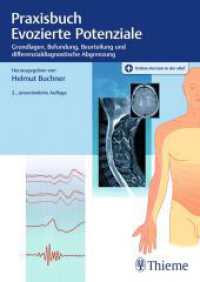Full Description
Assessment is central to learning. It is not just about testing or measuring learning; it is a key part of the whole learning process. Positive experiences of assessment can enable students' capacity for self-directed learning throughout life, making them curious, goal-orientated, aware of success criteria (or able to formulate their own criteria), and effective evaluators of their own work.
There have been significant changes in how curriculum authorities, schools and teachers approach learning, teaching and assessment. Teachers need to know how to design effective and engaging assessment, how to assist and encourage their students, how to provide feedback that enables learning, how to make judgements and to measure the extent to which students reached the standards at the end of a learning period, how to interpret data and report on students' progress.
This text demonstrates how and why assessment should be firmly embedded in the day-to-day practices of teaching and learning. Teachers learn as much from the assessment as their students do. The reflective practices required to capitalise on this knowledge to further learning are addressed throughout the book.
This book will give pre-service teachers, and current teachers as well, ways of developing the skills, competencies and confidence necessary to conduct assessments that will complement their teaching and enrich their students' learning.
Contents
Part 1: Assessment Principles1. Developing Healthy Attitudes to Assessment for Teachers2. Developing a Healthy Attitude to Assessment among Students3. Non-Negotiables in Assessment 4. From Assessing with Standards to Assessing with Learning ProgressionsPart 2: Assessment Practices5. Planning and Programming Assessments 6. Classroom Formative Assessment Processes 7. Creating Helpful Feedback Cycles 8. School-based Summative Assessment: Design, Development and Conduct 9. Accommodations of Assessment for Students with Special Needs 10. Making Judgments about Student Achievement 11. Recording and Reporting, Reviewing and RespondingPart 3: Assessment Perspectives12. Planning and Assessment in the Early Years 13. Assessment in Primary and Lower Secondary Years in State and Australian Curricula 14. Assessment in the Senior Phase 15. Classroom Implications of Standardised Testing and Examinations 16. Using Emerging Technologies to Engage with AssessmentConclusion: Charting the Territory for Assessment Futures








